CES 2014: Director loses direction as teleprompter fails
- Published
Michael Bay initially said he would "wing it" after his autocue malfunctioned
As there was just so much happening on press day at the Las Vegas Consumer Electronics Show 2014, we thought we'd bring you a selection of highlights - and some of the lowlights - as they happened.
Monday 8pm PST
Audi brings Press Day to a close with the last of the day's Keynotes.
The German automaker's chief executive Rupert Stadle headed a presentation that featured self-driving cars, dancers who looked liked they had escaped from the movie Tron, and a vehicle fitted with laser lamps.
The madness continues tomorrow.
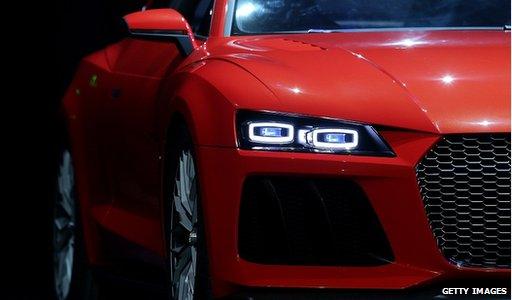
Audi brought a car whose headlights use a combination of LED lamps and lasers
Monday 7pm PST
There were lots of wearable tech prototypes, a fancy mini-computer and more at Brian Krzanich's Keynote address.
The Intel chief executive has been in charge of the firm for less than a year, making this his first CES as CEO.
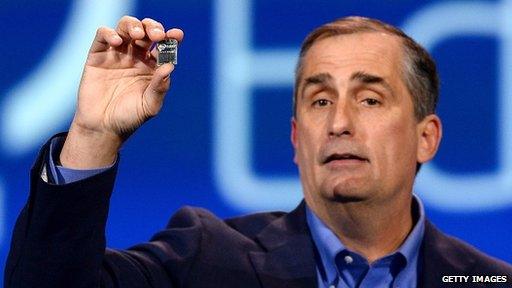
Brian Krzanich unveiled Edison, a computer the size of an SD card, at his presentation
One part of his presentation, however, marked the end rather than the start of an era - the decision to rename the firm's security products division.
It is ditching the McAfee brand and replacing it with Intel Security.
The controversial founder of the security business, John McAfee, told the BBC he was overjoyed by the news.
"I am now everlastingly grateful to Intel for freeing me from this terrible association with the worst software on the planet. These are not my words, but the words of millions of irate users.
"My elation at Intel's decision is beyond words."

John McAfee says he is elated by Intel's decision to drop his name from their software
The reaction should come as no surprise. Last year Mr McAfee released a video showing how to "uninstall" the firm's anti-virus software by blasting a laptop with a bullet.
Monday 6pm PST
Video games developer Valve has confirmed 14 companies will manufacture the first generation Steam Machines - "PCs consoles" designed to run its new Linux-based gaming platform.
In alphabetical order, external, they are Alienware, Alternate, CyberPowerPC, Digital Storm, Falcon NW, GigaByte, iBuyPower, Maingear, Material.net, Next Spa, Origin PC, Scan, Webhallen and Zotac.
They range in price from $499 to $6,000.
It's a respectable line-up - Alienware's involvement means Valve has the backing of its parent company Dell.
But one senses that neither the Xbox team nor their PlayStation counterparts are likely to be quaking in their boots - at least at this point.
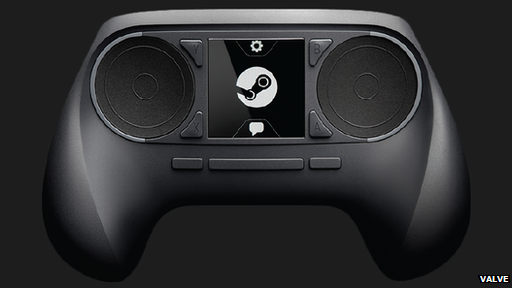
Although Valve will not make the PCs it has designed this touchpad controller
Monday 5pm PST
Sony, along with all the other TV makers it seems, has been plugging its UHD - ultra high definition - 4K TVs for all its worth at CES.
Screens are set to get bigger and bigger, with Sony's flagship 4K beast boasting an 85in (216cm) screen - not quite as big as Samsung's 105in (267cm) monster - but pretty chunky nonetheless. No doubt it will come with a similarly gargantuan price tag attached.
But surprisingly, Sony did not unveil a new OLED - organic light-emitting diode - TV.

MakerBot's largest 3D printer can make high-volume polymer prototypes
Earlier, MakerBot, the 3D printer specialist, announced three new machines, including a mini one-touch version priced at $1,375 (£838).
At the other end of the scale, MakerBot's new Replicator Z18 printer, stands nearly 46cm (18in) tall on a 30.5cm (12in) square base.
It costs $6,499 (£3,963) and is aimed at inventors wanting to make large industrial prototypes, primarily from polylactic acid (PLA), a biodegradeable polymer.
Monday 4pm PST
BBC Technology Editor Rory Cellan-Jones has been checking out Epson's rival to Google Glass. If you thought Epson only made printers, think again.
"The Epson Moverio 2 is a clunky name for what is really quite a clever product," Rory reports.
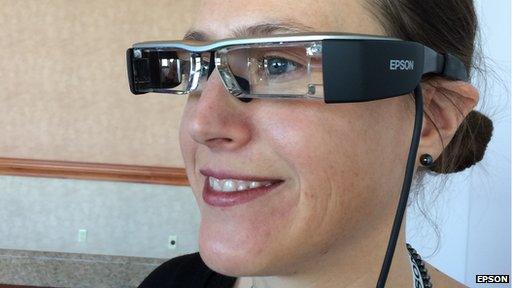
Epson's Moverio 2 "smart" glasses are "clunkier and more geeky looking" than Google's rival Glass product, says Rory
"These smart glasses do a number of jobs: They allow you to watch movies in panoramic 3D; give you access to all sorts of Android apps and content; and they provide an augmented reality experience.
"In other words, this is a rival product to Google Glass, with the difference that it actually has a price tag and will soon be on sale to consumers."
But Rory thinks Moverio 2 is "clunkier and more geeky looking" than Google's product, especially as it needs a separate controller tethered to it.
"This looks like clever technology, but somehow you can't see many consumers walking down the road in Epson glasses," he concludes.
Monday 3pm PST
If you don't want to fork out for one of the latest smart, internet-enabled TVs, there are a number of products than can help your flatscreen punch above its weight.
FreeCast's Rabbit TV Select, for example, a small $99 (£60) quad-core powered set-top box, connects to any TV with an HDMI input and turns it into a brainy networked device capable of handling internet TV, emails, and video calls, its makers claim.
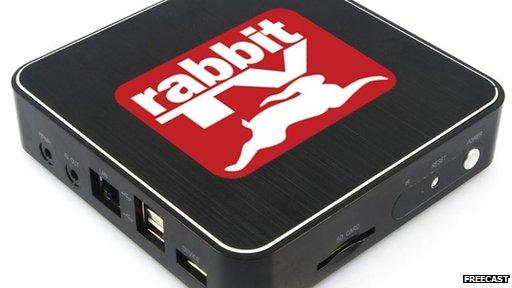
Rabbit TV's "puck-sized" set-top box can make flat screen TVs smarter
The device can also communicate with tablets and mobiles and even manage your home security system.
FreeCast's Rabbit TV Network offers videos-on-demand and thousands of online games.
Monday 2pm PST
When our roving technology reporters aren't poring over the latest gadgets or listening to the latest keynote speeches, there are other quirky sights to behold at CES, as this picture from Dave Lee shows.

It's not all gadgets at CES, says the BBC's Dave Lee
And pretty soon we'll be able to share our pics in 3D, if Intel is to be believed.
Launching the "world's first and smallest" integrated 3D depth and 2D camera module, Intel said its RealSense technology will help devices, including smartphones, cameras, tablets and laptops, "see" depth much like a human eye.
The company demonstrated the camera using products from Dell, Lenovo and Asus.
It said the new camera would feature in gadgets from Acer, Fujitsu, HP, and NEC, as well as the three companies already mentioned, in the second half of 2014.
Meanwhile, Samsung flaunted its curves, unveiling its first commercial curved-screen ultra high definition (UHD) TVs, the biggest of which is a gargantuan 105in (267cm).
A flat-screen TV can be transformed into a curved-screen TV at the touch of a button.
It's all about offering "mesmerising immersion", the company said.
Unfortunately for Samsung, teleprompter gremlins forced Michael Bay, director of the Transformers film - and the technology company's guest speaker - to quit the stage in embarrassment.
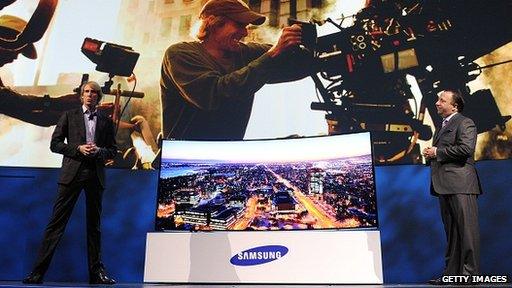
Michael Bay later said he felt "embarrassed" by the incident
"When the autocue wouldn't work he seemed at a loss to know what to say," said BBC technology reporter, Carolyn Rice who witnessed the incident.
"After a few false starts he just apologised and walked off the stage. There was an awkward silence as everyone waited to see if this was a dramatic interpretation of a new device.
"But no, this really was a director who had lost his direction."
Monday 1pm PST
When it comes to pixels, you can never have enough it seems.
Just when we've got our heads around ultra high definition 4K screens offering picture resolution four times greater than our current high definition TVs, along comes Sharp, Phillips and Dolby showcasing 8K technology.
Sharp says its 7,680 x 4,320 screens are the equivalent of 16 times the pixel resolution of current HDTV.
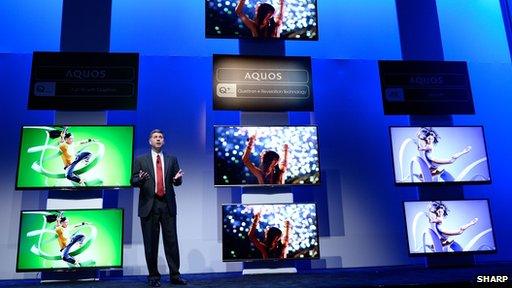
John Herrington, president of Sharp Electronics Marketing Company of America, shows off the company's new line-up of ultra high definition Aquos TVs
It says the picture is so sharp - no pun intended - it gives a "3D experience" without the need for those annoying glasses.
Sharp first showed off its prototype 8K technology at CES 2012, but this year is doing so on a whopping 85in (216cm) screen, while also showcasing its more commercially viable 4K-ready Aquos large screen TVs.
Monday 12pm PST
Demand for power is outstripping supply in the press centre.
Our technology correspondent Mark Ward sent in this photo:
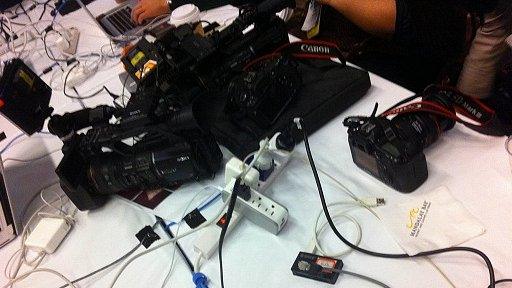
Monday 11am PST
So it's press day at CES and the announcements are coming thick and fast.
We've already covered LG showing off its jazzy new graphical user interface for smart TVs; Nvidia promising better mobile graphics; and Parrot's leaping and flying toys.
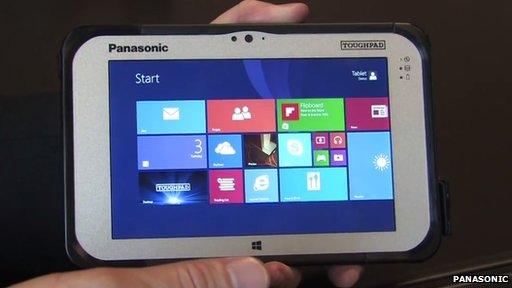
Panasonic's new Toughpad tablet can incorporate a high capacity battery offering up to 16 hours of power
Now Panasonic has unveiled its latest "ruggedised" 7in (17.8cm) tablet, the Toughpad FZ-M1, targeted at business and government users who need reliability from their gadgets while out in the field.
Running Windows 8.1 Pro operating system and powered by a Intel Core i5 processor, Panasonic claims it is the "thinnest and lightest rugged fanless tablet" on the market.
It features a replaceable battery - the optional high capacity battery can give up to 16 hours of power - plus the ability to switch batteries without having to switch off the device.
But it won't come cheap. Panasonic says it will retail at $2,099 (£1,279) when it is released in the spring.
The company also announced a high-performance 20in (50.8cm) version of the Toughpad featuring an ultra high definition 4K screen. The cost? A mere $6,999.
Fed up of not being able to record two programmes simultaneously while watching something else? Then Dish's SuperJoey product, that allows viewers to record eight shows at the same time, could be of interest.
Dish, a US digital video recording (DVR) specialist, unleashed a number of enhancements to its Hopper Whole-Home HD DVR platform.
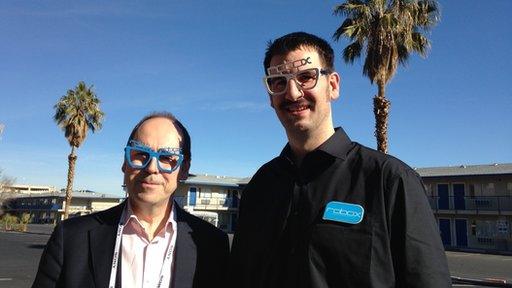
The BBC's Rory Cellan-Jones and Robox's Chris Elsworthy with a different take on "wearable tech"
But it's not just established names exhibiting at CES - newer companies and start-ups have a valuable opportunity to get their products seen by the tech community.
Chris Elsworthy from UK 3D printing firm Robox is a first-timer at CES.
"This is huge for us," he told the BBC's Rory Cellan-Jones. "It's a first show ground. It's important for us to be here and showcase our product."